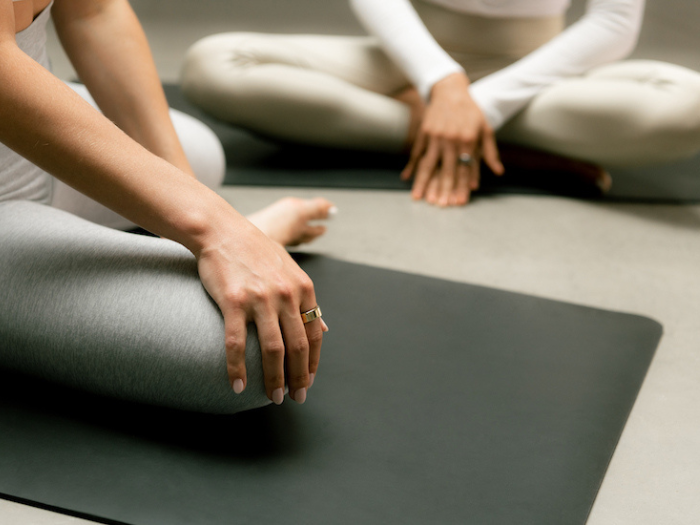Wdoes it actually mean to be present? Can being in the present bring you to that utopian state called peace?
Being in the present means being alive with the moment ― fully engaging with your environment, body, and feelings as they are ― with intention and without judgment. It is transforming mindfulness from a 30-minute activity to a lifestyle. When you’re in this state, you can give your complete attention to the moment’s needs and satisfy them accordingly.
| Member Tip: Oura tracks your Restorative Time so you can see how long you are spent in a relaxed state throughout the day. When you have these restorative breaks, try to enjoy them and feel present. |
The Health Benefits of Being Present
Practicing presence may not be the magic fix for your problems. Still, it has many benefits for your physical, mental, and emotional health.
Research suggests that cultivating present-moment awareness can lead to reduced stress levels, improved emotional regulation, and enhanced overall well-being. In the realm of cardiovascular health, mindfulness practices have been shown to lower blood pressure and resting heart rate, and increase heart rate variability.
A study examining the connection between mindfulness and physical and psychological health concludes that “individuals high in mindfulness showed better cardiovascular health and psychological health.” Interestingly, an article published by the Journal of the American Association of Nurse Practitioners suggests that practicing focused awareness can help reduce perceived stress and anxiety and improve quality of life.
Being present has been linked to better immune function, reduced inflammation, and enhanced pain management. Psychologically, mindfulness practices promote resilience, greater self-awareness, and improved cognitive function.
The benefits of practicing presence also show up in your relationship with yourself, your work, and the people around you. It’s a rule of thumb. You’ve seen it happen time and time again. Whatever you give your undivided attention to flourishes — from self-care to your work, to the relationships you have and are trying to build.
When you’re present, you become one with yourself and your environment, savoring every moment and accepting every emotion. All of these require you to let go of the past and avoid obsessing over the future. It’s in this state that you may find peace.
| Member Tip: Oura tracks your Resilience, or your body’s ability to effectively balance daytime stress and recovery. When you spend more time in the present, you may notice your Resilience level starts to improve. |
How to Be Present: 9 Suggestions

1. Immerse yourself in every activity.
To immerse yourself in activities is to tap into your senses and bring them to focus on what you’re doing.
You can embrace moments in your life by actively participating in them. It could start with relishing the taste of your food, noticing the smell of your garden in the morning or the color of the sky during a walk, enjoying the beats and tunes in a song, etc. All you need is an impartial and heightened awareness of and surrender to your senses.
2. Find your flow and lose yourself in it.
Finding your flow means finding an activity that engages your mind to the point where nothing else matters. This activity draws you in so much you get an out-of-body experience while being alive.
Your flow could be listening to music, reading a book, playing a sport, taking a shower, watching a movie, playing an instrument. As long as it can silence the chatter in your head, it works.
3. Schedule time to worry.
The mind is an “anticipation machine, and ‘making future’ is the most important thing it does.” A study in Nature Reviews Neuroscience says it does this by constantly curating past experiences and updating present information to predict the future. When we face an unfamiliar and uncertain situation, our brain goes into overdrive to make sense of it. Once it cannot, we get into a worried state.
By now, you know that uncertainties are an inevitable part of living. You also understand that telling yourself: “Don’t worry, everything’s going to be alright” rarely makes you feel better. What if you tell yourself this: “I am worried, but I should look into these bothersome thoughts some other time.” You may not believe this, but postponing your “what-if” moments to a more convenient time helps you stay calm and grounded in the present.
It is no wonder research indicates that people who scheduled their worries had significantly lower stress levels compared to those who didn’t.
 4. Create a daily routine.
4. Create a daily routine.
Establishing a structure for your daily activities puts you in control. It gives you a sense of certainty and predictability, which we already know our minds love. Routines empower you to live moment to moment. When your mind is sure of what’s to come, and is aware of your involvement in what’s past, it becomes secure in the present and can be fully engulfed in it.
5. Focus on the process rather than the goal.
Many of us are big dreamers. What’s worse is that sometimes we let the dreams of a desired future consume us, losing sight of what’s important: the journey that gets us to the desired destination. When you focus on the process rather than the goal, it brings you to own your current situation and discover how you can make the most of it.
READ MORE: Your Mindset Matters: How to Build Resilience to Stress with a Growth Mindset
6. Recite a mantra.
A mantra is a word or phrase that’s recited repetitively. It’s one of the most popular and powerful tools of meditation.
Repeating a positive statement when your mind is in a downward spiral of overthinking allows you to take control of your thoughts and stay in the present moment. Evidence also shows that including mantra repetitions in daily routines can help manage stress and enhance calmness, resilience, and well-being.
7. Reduce your screen time.
You saw that coming. Didn’t you?
With notifications popping up here and there, begging for your attention, it’s difficult to resist the urge to not always be on your phone.
To break your attachment to your phone, you can:
- Track your screen time
- Take social media breaks
- Establish no-phone zones in places like your bedroom and dining area
- Turn off your notifications
- Turn on your phone’s grayscale mode
Doing these will reduce your screen time and give you more time to focus on yourself and your environment.
8. Practice gratitude journaling.
Another way to bring our wandering minds back into the present is to start gratitude journaling. Gratitude journaling is an activity that involves a great deal of looking in and self-appreciation. Writing down the aspects of your life you’re grateful for helps you control what the voices in your head tell you about you. It also makes you more receptive to embracing the present.
READ MORE: How Journaling Can Improve Your Health — And How to Make it a Habit!
9. Check in with your body.
Consider dedicating at least 10 minutes of your day to check in with your body. When you check in with your body, you’re listening to it and taking note of every feeling, sensation, and emotion without giving meaning to them.
| Member Tip: Access Explore content on Oura to take a break from the busyness of the day. You can access guided meditations and breathing exercises straight from the Oura App. Doing this boosts your productivity by refreshing your mind and recentering your focus. |
One of the hardest things is to bring your whole consciousness into everything you do, at every point in time. Once you get the hang of it, your life and engagement with reality become more fulfilling. Every moment is a gift; appreciate it by embracing it.
RELATED: Try Oura’s Guided Sleep Meditations for Deep and Restful Sleep











